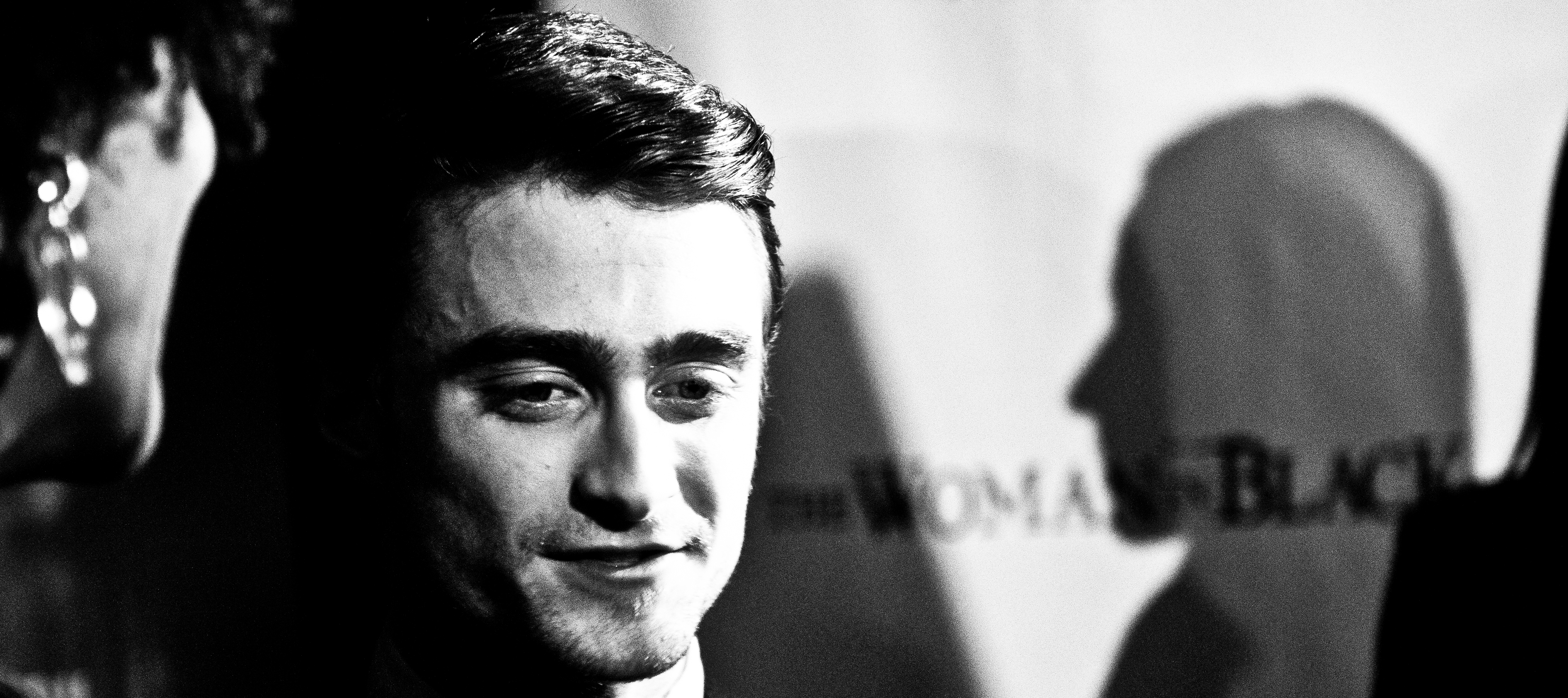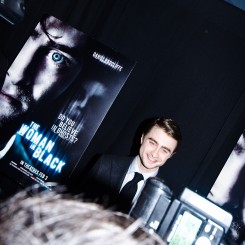“A lot of modern horror can leave me cold. I’m not good with blood and gore and all that stuff. There’s nothing entertaining for me about watching that kind of film.”
At the Yorkville Hazelton Hotel, Daniel Radcliffe sits at an intimate round table interview to promote his upcoming Hammer Horror film, The Woman in Black, his first major screen production since the end of the Hogwarts era. Each of the 11 journalists in the room has been prepped to “limit the Potter questions.”
A reporter asks if the young actor spent much time watching the early Hammer Horror films of the Christopher Lee period to prepare for the film.
“The only one I know is [their] first Dracula film. I think I’m probably the last generation in England to have sort of grown up with that; it was on TV,” he laughs, beaming at the reporter. In contrast to his slightly abashed and awkward presentation in television interviews, Radcliffe holds a comfortable engaged presence throughout.
“I think the first time I watched it was at school; it was kind of an end of term thing when the teachers can’t be bothered to teach you anymore.” The room bursts into laughter. “One of our teachers brought it in and played it. Everyone in our class wanted to be Christopher Lee, except for me. I wanted to be Peter Cushing. If [The Woman in Black] had been made 30 years ago, [Cushing] would have beaten me to this part 10 times out of 10.”
“Not because of Dracula, but because of [his role in] Star Wars, right?” a reporter jokes.
“Yes, of course,” Radcliffe grins, then whispers, “I’ve never seen Star Wars. I know that’s a terrible thing to admit…”
There is an awkward pause and an echo of quiet chuckling until a reporter shouts, “Be proud!”
“Be proud, yeah! why not!” He laughs. His rambunctious energy fills the room again.
“I’ll send you a copy,” another reporter blurts out. This joke carries on for a good minute.
In The Woman in Black, Radcliffe plays Arthur Kipps, a lawyer in Victorian England who comes to settle the funeral arrangements for a reclusive widow in a small English town. A depressed father, Arthur soon notices a woman dressed in black who proves to be a supernatural presence wreaking havoc on the town. The screenplay is adapted from Susan Hill’s 1983 novel of the same name and doesn’t stray far from a standard horror storyline driven by demonic children and elderly women.
Though Radcliffe plays a much older role and sports a lacy a getup, he explains that he was “under no illusions that people would see this film and say, ‘Oh, Christ! Well he’s not Harry Potter anymore. He’s completely transformed.’ Over the next couple of years, it’s definitely going to be about doing as much as possible and making [my acting choices] as varied as possible.”
The next reporter mentions Radcliffe’s decision to seek out the author of the original book, though he avoided seeing the novel-based play that later came out.
“Well, it’s mainly about making sure I’m on the right track,” he explains. “Because the script is an adaptation, it’s very different, both in the character Arthur and in the entire framing of the story. I was very keen just to make sure that I wasn’t doing anything that would piss her off.”
“I spoke to a couple of friends about depression and the nature of depression,” he continues. “One of the things they said to me, which I found fascinating and useful, was how physically exhausting true depression is. There is a serious effort to get out of bed in the morning, both physically and mentally, so that’s kind of where I started with Arthur.”
As my turn draws nearer, it becomes increasingly difficult to separate Radcliffe from Potter. Despite his clear lack of teen wizard angst, his mannerisms, expressions, and appearance are one and the same. In a desperate effort to make a good impression, I ask whether there were any Victorian poets who influenced him during the filming process, as the actor has previously claimed to be a poetry aficionado.
“I don’t suppose there was particularly. I mean, no,” he replies. “I used poetry a lot when I was doing Harry — a lot of Shelley, actually. I love the romantics and that whole era. But there wasn’t a huge amount of poetry for this one. The only method I think I came up with was for those days when you just played terrified reactions for hours. I found it useful to kind of take myself off to the corner of a set and just pace and mutter insanely to myself and sort of work myself up into a bit of a frenzy and then go on set. This is why I’m really desperate for a process [and] why I love theatre … on stage: you just have to go on and look and listen and it’ll happen. There’s no room for self-consciousness to creep in like there is on film.” Again, he explains that “the next couple of years are going to be about trying to find what works for me.”
The actor recalls someone asking him if he thought his Harry Potter fans would stick with him to this film, to which he gave a characteristically self-deprecating reply, “If they stuck with me through Equus they won’t mind this. This is nothing in comparison to that.”
As I exit the hotel, a small group of girls is waiting outside yelling “Come out, Harry Potter!” in an attempt to coax Radcliffe out of the building. He’s got some time before his Harry Potter fans leave his side.



